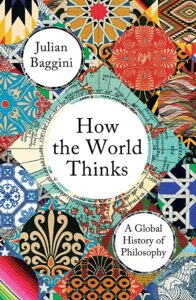
In How the World Thinks, Julian Baggini provides a history of global philosophy that includes many of the traditions and thinkers often excluded from other histories. Although Western philosophy and history starts with the ancient Greek philosophers, several other traditions were forming at the same time, including the Chinese tradition and Confucius, Buddhism, and the different traditions of Indian philosophy which were expressed in the Upanishads up to the 6th century BCE, but had been developing for almost 2,000 years before.
These different traditions relied on different sources of knowledge. The Greeks, especially after Socrates, focused on logical thinking while Indian traditions relied on ‘seers’, Chinese on experience and tradition and Buddha said that while experience is all we have it is illusory.
After these early traditions, the Middle Ages were mostly the Dark Ages, with the exception of Islamic philosophy and its development of different mathematical disciplines and preserving and translating the works of Aristotle and other Greek philosophers.
This was followed by the Renaissance and then the Enlightenment, with different schools developing based on a focus on reasoning or a focus on experience (e.g., the British Empiricists).
The book covers different philosophical questions (knowledge, ethics, self, etc) from the differing perspectives of traditions from Europe, Asia, America, Middle East, and Africa. Recommended reading for anyone who wants to understand the big picture of human thinking and values.





